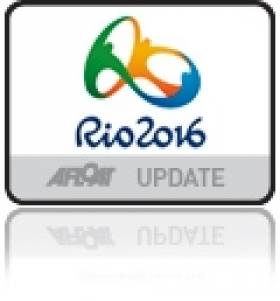Displaying items by tag: Andrea Brewster and Saskia Tidey
Ulster's Espey in Gold Fleet Position at ISAF Sailing World Cup, Trofeo Princesa Sofía
#TrofeoSofia – James Espey is the only member of the Irish Olympic Sailing Team to qualify for this morning's gold fleet racing at the ISAF Sailing World Cup Trofeo Princesa Sofía in Palma. The Belfast dinghy sailor scored seventh in yesterday afternoon's race five to give him three top ten results to bring him up to 24th overall in his massive 144–boat fleet.
The results scored 10, 13, 8, 27 and 7 are all the more satisfying for the Royal Ulster sailor given they were produced in difficult light winds, conditions that have frustrated his Irish London 2012 team–mates and have consigned them to silver fleet participation for the rest of the regatta.
The shifty winds kept the sailors busy all day with bands of wind up to 14–knots then down to 6–knots coming down the course areas of the fourth ISAF World Cup event.
Fleets are now split into gold and silver for the final three days before the medal race on Saturday.
After four races Annalise Murphy counts 32, 46, 48 and a 31 to be placed 86 from 96. It's a big disappointment for the Irish Laser European champion especially given her light wind preparations at the Rio Olympic venue itself last season plus there are forecasted strong winds expected later this week, sailing conditions which the Dublin 'Breeze Queen' relishes.
One race in the split 96-boat Laser Radial fleet sees Murphy's long time rivals Marit Bouwmeester (NED) head into gold fleet racing two points clear of Great Britain's Chloe Martin.
Bouwmeester finished second in the yellow fleet whilst Martin took a third in the blue fleet as the top two spots remain unchanged.
"It was a nice day even though it was quite a long day on the water because we got a good race in and now we can do gold fleet racing," said Bouwmeester. "There are so many girls here and the racing is really good. It should be a fun three days in the gold fleet which will be nice."
Despite setting the early pace Bouwmeester isn't getting carried away, "I'm just trying to sail as best as I can, learn as much as I can and then if I win I would like that but if not then there has to be more work done."
The days race wins went to Daphne van der Vaart (NED) in the blue fleet and Anne Marie Rindom (DEN) in the yellow fleet.
Racing got off to a late start in the afternoon with a light morning breeze ensuring Palma Bay resembled a shiny pane of glass. When the first race got underway after 14:00 local time a moderate 5 knot breeze that picked up to 10 knots saw the light wind specialists continue their strong early form.
On a separate course, with scores of 19, 31, 23, 22, 25, and 19, Belfast lough 49er duo Ryan Seaton and Matt McGovern lie 51st from 79.
Last night 49erfx Irish newcomers, Andrea Brewster and Saskia Tidey, who are making their Rio campaign debut in Palma reflected on their overall position of 44th from 50 on twitter:
"Tough day for us at the office. A wee bit soul destroying when the things you can't control attack and you're left to fight back... Today was not our day. We have come away from it with the positives which were good speed and starts again. We will be competing in silver fleet for the rest of the regatta which will be an excellent opportunity to practice what we need to and take the most we can from the rest of the week. We got this ... Just need to give it time and have patience!
Unfortunately our result on the score board doesn't show how much our sailing has improved and how far we have come this winter but we are happy and feel like we are making gains and couldn't be prouder!"
The girl's Royal Irish club–mate Ross Hamilton is 72 from 92 in the Finn dinghy.
How to handle the super tricky conditions experienced so far in Palma are captured in this youtube account by British Finn sailors Andrew Mills and Giles Scott.
Racing begins this morning at 11am with an easterly wind of 5 knots shifting to a southerly position and increasing to 14 knots this afternoon and possibly more.
Full results here





























































